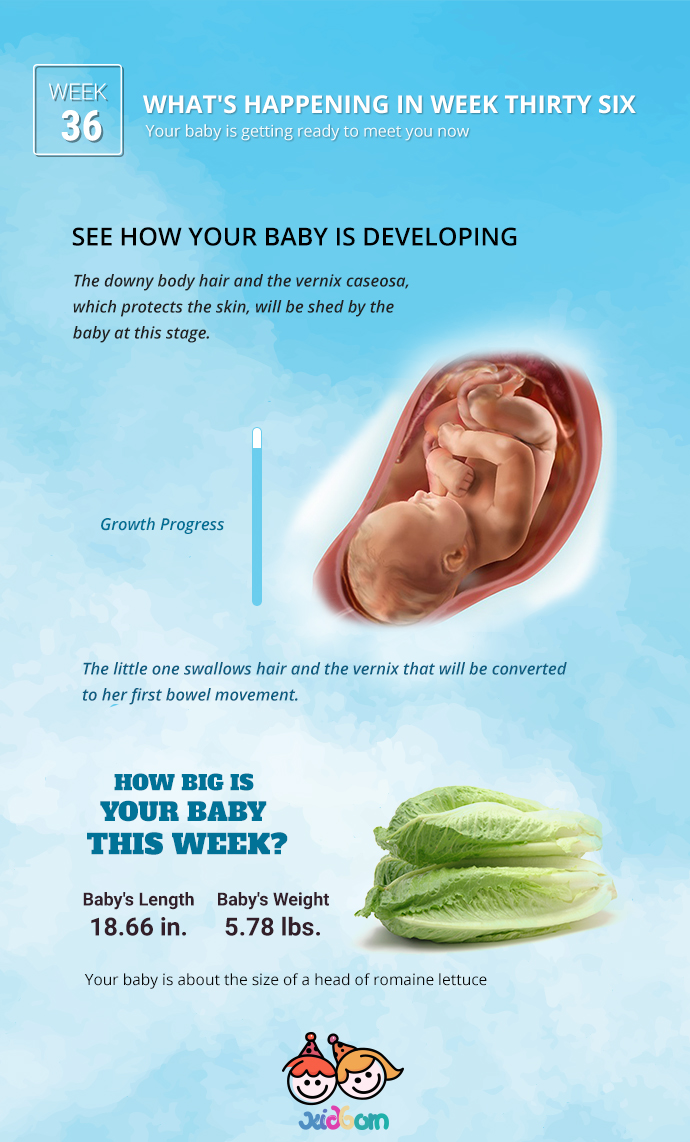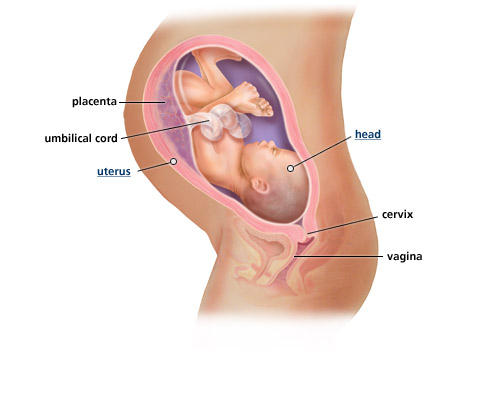
What is happening in your belly now?? It is 36 weeks, and you have only a few more to go to see your bundle of joy. The baby is all set to meet you and the world outside the womb. The little one moves further down your pelvis and is ready to engage and put on those few ounces of weight before they are born.
An average baby would weigh nearly 7.5lbs at birth. Therefore your baby has a tad more to gain just now. He/she will now be weighing approximately 6lbs. They’ll also mark in at close to 50 cm and still have a little bit of developing left to do.
Even during this point, you will able to feel him/her moving about.However, this time it will be much lower down in your belly. If you find any continued lack of movement, then you have to contact your midwife then and there, so that she can make sure that everything is as it should be.

During the 36th week, they will be shedding the downy hair that is remaining, which will combine in with the rest of the amniotic fluid which the little one will be swallowing with some of it reaching into their bowel and then becoming meconium, which will make their first bowel movement.
The immune system and the blood circulation will now be ready for the outside world after the long period of development. Although their digestive system isn’t actually ready and will take some months to catch up before your baby can begin eating solids.
Your baby is still putting on the pounds – at the rate of around an ounce every day. He/she will now weigh nearly 6 pounds and is now more than 18 1/2 inches in length, which is about the length of the head of romaine lettuce. The baby will now be shedding most of the downy covering of hair that covered the body of the baby, as well as the vernix caseosa, which is the waxy substance that covered and shielded its skin during its nine-month amniotic bath. The little one will swallow both these substances, along with the rest of the secretions, resulting in a blackish mixture which is called as the meconium that will make the contents of the baby’s first bowel movements.
As and when this week ends, your baby will be viewed “early term.” ( the Full term will be around 39 to 40 weeks. Babies born earlier than 37 weeks are preterm, 41 weeks is termed as a late term, and those babies who are born after 42 are post-term.) By this point in time, the baby should have moved head-down. And if it hasn’t, then your doctor or midwife may recommend scheduling an external cephalic version. This is a fancy way of stating that your healthcare provider will apply pressure to your abdomen to attempt to manipulate your baby into a head-down posture.
The little one will now be the size of a canary melon, and its wrinkly suit of skin would just fill out as it gets fatter.
Baby’s Length: The length of the baby will be around 18.66 inches,
Baby’s Weight: He/she would now weigh nearly 5.78 lbs.

Head: The baby would have now moved to a head-down position, and this is the optimal position for a smooth delivery. The baby’s head may be dropping lower toward your pelvis.
Uterus: The Braxton Hicks contractions which you had, may turn out to be a little more often now.

The baby has taken lots of space in your uterus and thus you will now find it difficult to eat a normal-size meal. It will be easier for you to handle smaller and frequent meals at this point rather than three large meals. On the contrary, you will not have much difficulty in breathing when your baby begins to drop down to your pelvis. This process is called as lightening, and it often occurs a few weeks before the labour if this is your first baby. (If you’ve given birth previously, it apparently won’t occur before labor begins.) Furthermore, you will also reduce heartburn. If your baby drops, you may also experience increased pressure in the lower abdomen, which may make walking more uncomfortable, and you’ll plausibly discover that you have to pee even more often. If your baby is very low, you may experience lots of vaginal pressure and trouble as well.
Make sure that you review the indications of labour with your doctor or midwife and check out when she needs to hear from you. As a common rule, if you’re full-term, your pregnancy will be termed as ‘uncomplicated’, and your water hasn’t broken, she’ll mostly have you wait to come in till you’ve been having contractions that remain for nearly a minute each, arising every five minutes for one hour. However, you should call your doctor when you find a drop in your baby’s activity or believe you’re leaking amniotic fluid, or if you have any bleeding in the vaginal area, fever, a severe or a tenacious headache, persistent abdominal pain, or even vision changes.
It is the most powerful creation to have life growing inside of you.There is no bigger gift